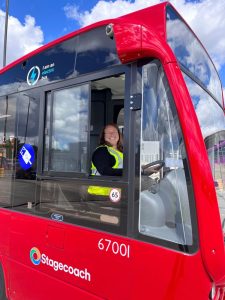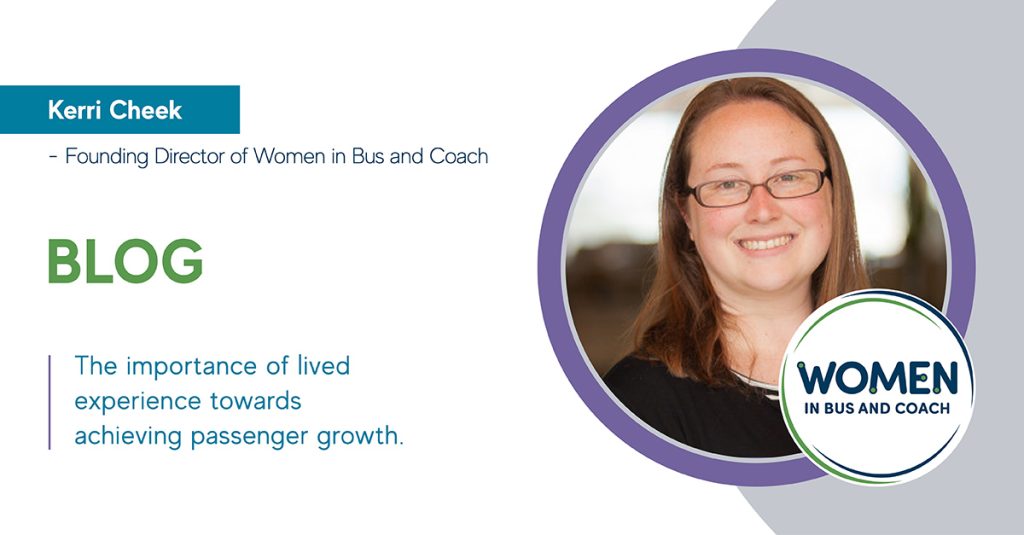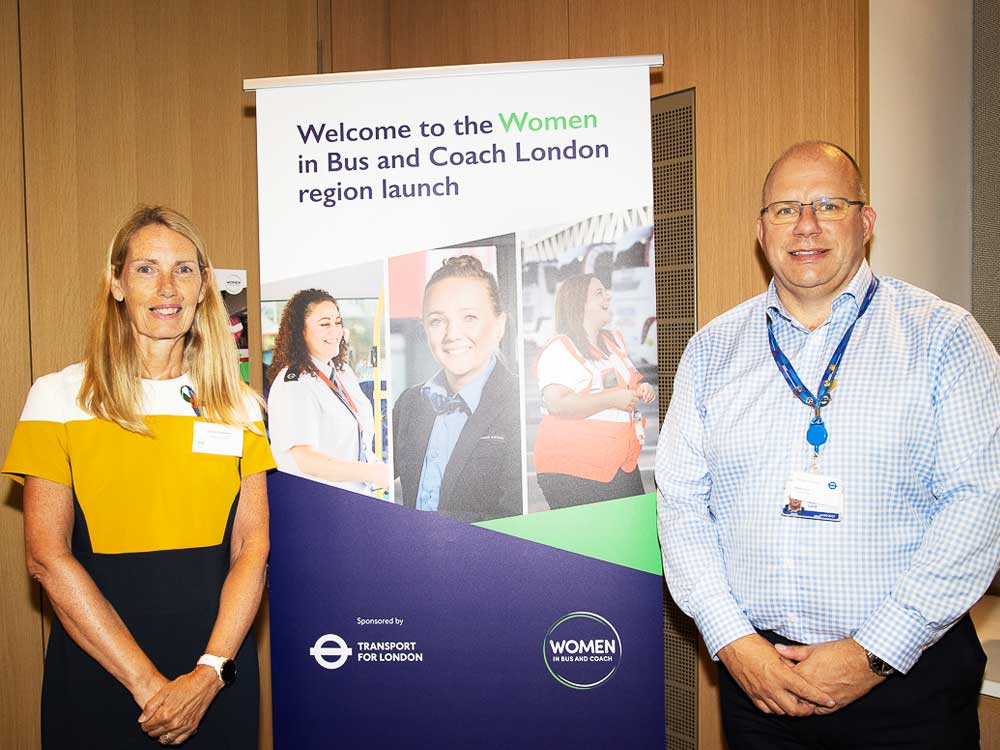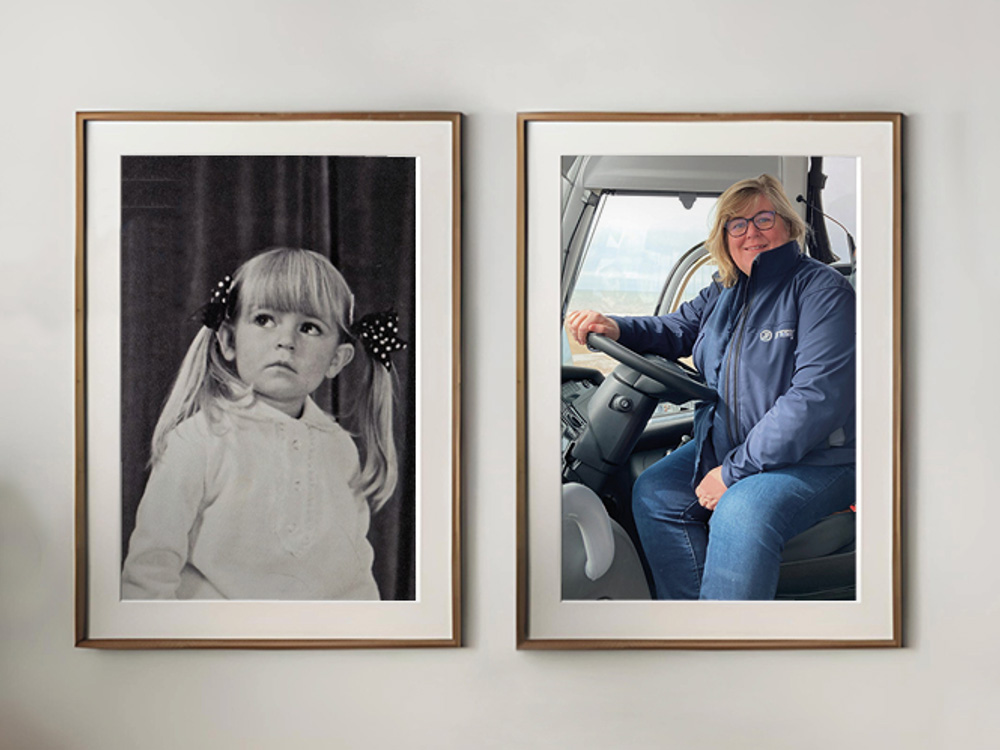In addition to my role as Senior Bus Safety Development Manager at Transport for London (TfL), I am proud to be one of the founding Directors of the new Women in Bus and Coach initiative, with the remit of our strategic lead, I’m also the Chair of the London Region of Women in Bus and Coach. My role from the start in the initiative has been one of evidence-led, positive and strategic change.
If we want to make the bus industry fit for the future, then we need to represent our customers better.
Reflecting our customers is vital to grow patronage and revenue, and to achieve a growth in sustainable travel which is better for all of us.
Women’s travel purposes can be very different to that of men. Trip-chaining: school run – work – shopping and so on. More women may make shorter and are often local journeys which may be higher yielding, and are no less important than commuter journeys. We are here to support our communities and everyone in them.
Women may travel differently: with a buggy, with children, with shopping, while pregnant. In London, we have more older women travelling by bus, they may need time to sit down safely. I heard a story recently about a passenger who was so grateful to have had a woman bus driver when her bus arrived at her stop as the passenger was trying to calm her crying child and was worried about getting on the bus. The driver told her she was doing a good job and to get on the bus – sometimes these small things are the ones that make the most impact.
Women’s experience of personal safety (whether perceived or lived) is usually very different to that of men: considerations of ‘where do I sit?’, ‘who’s around me?’, and ‘how dark is it?’ Did you know we teach schoolchildren about the issue of sexual harassment on buses? Run by the London Transport Museum’s education team, it is called Project Guardian, it aims to highlight and stamp out sexual harassment on public transport. It’s a brilliant course, but the fact that we need to do that is appalling to me. And I can tell you right now as a woman and a mother, I would never leave a child by the side of the road because they had forgotten their pass.
But, despite this, we often make decisions for our services based on a generic ‘bus passenger’ description. Neither male nor female, they may be data on a page, they start their journey here and end it there. As long as they get there as quickly as possible and ‘safely’ (i.e., no injuries) then we can calculate how the passenger values their time and justify more investment for more of the same. This is sometimes true, but if we stop looking at passengers generically, we open a much more complex and nuanced world of what customers value. If we understand that better, then perhaps we can achieve something extraordinary.
Now, you may be sitting there thinking ‘well how hard can that be?’ I can imagine what our female bus customers want, that’s what we’ll deliver. Sometimes that is enough. But quite often it falls short or is poorly executed. For example, here’s a lovely new bus stop, it has a seat, it has good travel information, it is well lit and regularly served by buses. What could possibly be wrong with that? As a woman, standing on a dark road, I want that bus stop placed such that I can see all around me. I don’t want hedges, walls, blindspots. These all hide potential threats. I want the bus stop in a public place (busy), but not outside a pub for example. I want to feel safe but not complacent. And when my bus arrives, I want to feel the same for my journey. Perhaps I sit near the driver to feel safer; perhaps I don’t head upstairs in case it’s empty or there are people that would cause me concern; perhaps I choose to sit on the aisle seat to try to prevent becoming ‘trapped’ in my seat by a male passenger. But if I feel unsafe or am harassed by another passenger, how easily can I contact the driver or otherwise get help? Not very well – we’ve sealed all the cabins and because of concerns for their personal safety we tell drivers to remain there. There’s no passenger emergency alarm. The bus isn’t designed with women in mind – only the generic passenger. I love the new USB ports, however as I travel around the UK I have found some have been fitted such that another passenger would need to invade my personal space to plug their cable in. This is not achieving a customer-centric design.
Half of the population in London are women. More than half of our bus customers in London are women. Lived experience is an invaluable asset and something the bus profession needs to build on more.
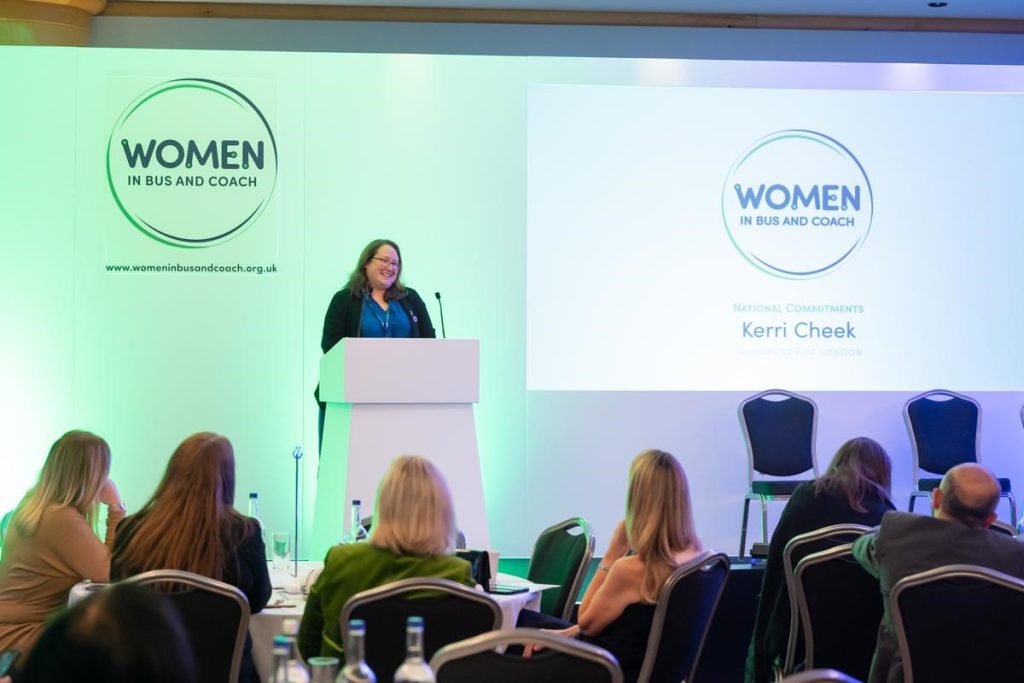
We need more women to work in our profession. That’s easy surely?
Currently, in London we’re doing a bit better than the national average, in that around 16% of our bus industry workforce are women, nationally its around 10%. I mentioned before that half of the population of London are women. There’s been discussion for decades about bus driver shortages. In 2022, the Department for Transport held a summit to discuss driver shortages – they had over 30 people in attendance, mainly men. Not one of their actions or recommendations was about how to attract more women into bus driving. When you don’t include women at the table, you won’t be as effective in your decision making. This is a well-researched area looking at the diversity of UK boards, which also showed that gender-diversity in senior management or boards increases productivity by at least 15%. And it’s not just about women, it’s about achieving diversity more broadly. Talking about UK boards, in London the proportion of the industry’s senior managers who are women, is much lower than 16%. As you read this today, there is not a single woman managing director of a bus operator, or an OEM, or equivalent in TfL, in the London bus industry. If we want women around the table, then firstly we need to ensure they get a seat at the table, if we want to grow our female-leadership then we need to ensure women see themselves reflected in leadership roles.
So, let’s consider the concept of ‘lived experience’ in diversifying our industry. Think about a time you were in an appraisal or development meeting with a staff member. (How many of you thought first of a male colleague?) The staff member is discussing promotion or development opportunities. There’s an opportunity they want to go for. How would you respond? Are you supportive? Dismissive? Do you change the subject? Perhaps you say: ‘but you’re so good in your current role, why would you want to move up?’ or ‘you wouldn’t really want THAT job would you?’ or perhaps, ‘you’ll miss your children too much doing that!’?
Not appealing? Yet these are all things that have been said to me personally during my career. This is part of what needs to change. If you bring limited expectations of what someone who may be different to you wants then you are limiting their growth, perhaps even putting them back and reducing their confidence. We need to build people up and enable them to follow their own paths, rather than putting obstacles in their way. I would say that this is particularly true for women who are often, whether naturally or through societal impact, prone to devaluing their experience and what they can bring to a role. I feel lucky and grateful to have now found colleagues and mentors that will champion me. How are you as individuals, and through your organisations, empowering and supporting women into your senior management teams?
To underpin our aims, Women in Bus and Coach conducted research into WHY women are so underrepresented in the bus industry. We found many barriers, which include:
- Macho culture – when you have a lot of men working together they can often develop a ‘macho culture’ which can be to their own detriment and is usually not accepting of anyone different. Coming into that kind of atmosphere as a woman is daunting. Being in a minority and the butt of ‘banter’ is daunting. Trying to fit in, not raising objections, being worried about needing time off for childcare or health reasons, all of these are things that women, and quite frankly anyone working in the bus industry, should not have to worry about. This is not modern business culture.
- Poor working environment – women have different needs sometimes than men. Certainly, regular access to toilets is a prime example. It is not easy for women to find a toilet where none is provided. We get complaints about male drivers urinating where they shouldn’t, a woman doesn’t even really have that option! And what about when a woman has their period? Women need regular access to good facilities that provide what they need. How about a driver’s personal security? Women drivers quite rightly raise concerns about being at quiet or remote bus stands at night.
- Shift work – this can be harmful to anyone’s health and something to be taken seriously, but there is evidence which shows there are links between poorer health outcomes in women and shift work, particularly around fertility. Shift work can also be problematic for childcare reasons – again this doesn’t have to exclude men, but let’s face it, women are still most likely to be the primary caregiver. I recently heard about a woman driver who needed adjustments to her shifts owing to a change in home circumstances and ultimately ended up leaving her role as it couldn’t be changed. Now, I’m not saying that every work pattern can be accommodated, but right now the attitude is one of ‘you fit in with what we’re doing’ rather than looking to try anything different. It’s been done before in other transport sectors, there’s no reason why this couldn’t be accommodated in the bus sector.
If we continue doing what we’ve always done, what’s been done before, then how can we expect to achieve a different result?
What can we do differently? You can start by engaging in positive change both on a personal level and through leveraging your influence. By working together we can be a force for positive change across the bus and coach sector.
- You could start with something manageable and familiar – mentor a woman in your business or volunteer for an existing women’s mentoring programme. Bring women into your senior management or Board meetings – even if only informally or under mentorship – this is incredibly empowering and you will find their insights and approach adds value to your business.
- Support Women in Bus and Coach events or hold diversity events yourself within your companies to champion differences and show inclusivity. Support activities that are being planned throughout the year, starting with Women in Bus and Coach’s inclusive and ergonomic cab design roadshow. We held our Women in Bus and Coach Summit last November, we deliberately ensured that we had a majority female attendee split. A male colleague said to me last week how daunting it had felt being in the ‘minority’ in the room, and how that had made him think about how it must feel for women and how he could make a difference. Create empathy and opportunity for people to come to their own conclusions about the case for change.
- Try something different. Innovate and trial something – what’s the worst that could happen? If it doesn’t work, stop, reflect and learn – then try again. Don’t be put off. I mentioned rotas earlier, almost a taboo subject I’ve found. When TfL introduced trials of fatigue detection technology and operators put in place a strong cultural emphasis (on a local limited basis) to self-declare when ‘unfit to drive’ due to fatigue or tiredness, there was initial alarm and scepticism about this approach: what if everyone says they’re too tired? We won’t have enough drivers! The reality? This didn’t happen. Sometimes our fears prevent us from trying something different, but when we move past that, we might be surprised and find they were unfounded. Perhaps the same can be said for looking at rotas and trying something different that would encourage more women to join the industry? Or what about setting up a crèche scheme? A new training programme on equality, diversity and inclusion? Or how about introducing a menopause policy?
All in all, be an active ally for women, and for Women in Bus and Coach.
I said at the start that my role is one of strategic change. To quote Karren Brady: ‘I don’t hear ‘no’, I hear ‘find another way to get what you want’. I think women have heard ‘no’ enough now and it is time for change. Women in Bus and Coach are here to work with you and support you through this change, which is how I envision the future of the bus industry. We are determined to achieve this as we believe the evidence shows this is the right way forward. Will you join us?
